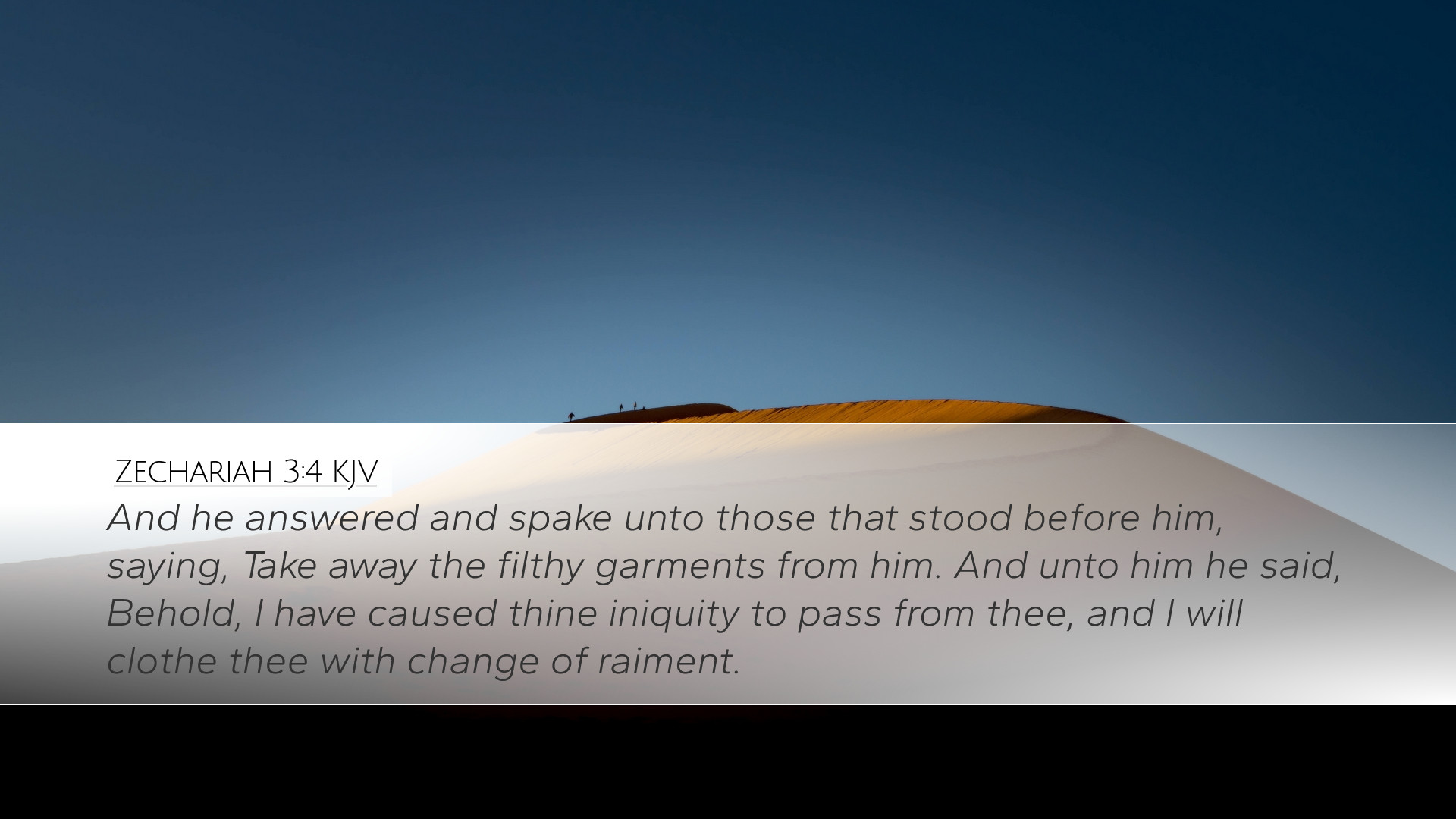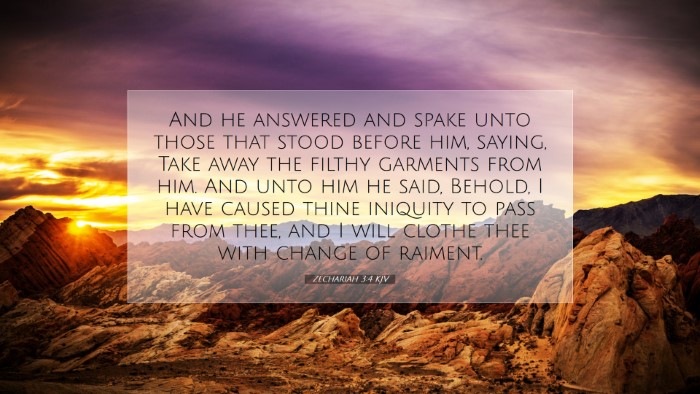Old Testament
Genesis Exodus Leviticus Numbers Deuteronomy Joshua Judges Ruth 1 Samuel 2 Samuel 1 Kings 2 Kings 1 Chronicles 2 Chronicles Ezra Nehemiah Esther Job Psalms Proverbs Ecclesiastes Song of Solomon Isaiah Jeremiah Lamentations Ezekiel Daniel Hosea Joel Amos Obadiah Jonah Micah Nahum Habakkuk Zephaniah Haggai Zechariah MalachiZechariah 3:4
Zechariah 3:4 KJV
And he answered and spake unto those that stood before him, saying, Take away the filthy garments from him. And unto him he said, Behold, I have caused thine iniquity to pass from thee, and I will clothe thee with change of raiment.
Zechariah 3:4 Bible Commentary
Commentary on Zechariah 3:4
Zechariah 3:4 states: "And he answered and spake unto those that stood before him, saying, Take away the filthy garments from him. And unto him he said, Behold, I have caused thine iniquity to pass from thee, and I will clothe thee with change of raiment."
Context of Zechariah's Vision
This verse appears within a vision experienced by the prophet Zechariah, which is rich in symbolism and implications for both personal and communal faith. Here we witness a heavenly courtroom scene where Joshua the high priest stands before the Angel of the Lord, accused by Satan. The imagery used by Zechariah conveys the themes of guilt, divine grace, and a transformative redemption.
Insights from Matthew Henry
Matthew Henry notes that the “filthy garments” symbolize sin and the ultimate shame resulting from it. The removal of these garments signifies the forgiveness and cleansing of sin by God’s mercy. Henry emphasizes that no one can stand before God in their own righteousness; it is through God’s grace that believers are justified and made righteous.
- Divine Intervention: Henry exclaims the importance of divine intervention in the life of a believer. Just as Joshua is cleansed, believers are reminded of their need for God’s purifying grace.
- The Role of the Accuser: The presence of Satan, as the accuser, highlights the reality of spiritual conflict. Henry elaborates that, like Joshua, we too face accusations not only from the adversary but also from our conscience.
Insights from Albert Barnes
Albert Barnes emphasizes the theme of restoration that permeates this verse. He points out that God’s proclamation of “Take away the filthy garments” serves as a promise of restoration, not only for Joshua but also for the people of Israel following their return from exile. Barnes adds that the garments represent Israel’s national stain due to unfaithfulness.
- The Promise of Cleansing: Barnes focuses on God’s commitment to purify His people. The phrase, “I have caused thine iniquity to pass from thee,” is a declaration of forgiveness that echoes throughout scripture.
- Change of Raiment: The change of raiment signifies a new identity that comes from God, transforming guilt into acceptance and shame into honor before Him. Barnes elaborates on this by connecting it with the Christian understanding of being clothed in Christ’s righteousness.
Insights from Adam Clarke
Adam Clarke explores the theological implications of God’s grace manifested in this passage. He argues that the act of clothing Joshua with new garments is symbolic of the new covenant established through Christ. Clarke posits that Joshua’s experience foreshadows the work of Christ, where believers are clothed with righteousness through faith.
- Symbolism of Garments: Clarke explains how garments in Scripture often represent one's standing before God. Dirty garments symbolize sin and disgrace, while new garments reflect a holy standing restored by God.
- Foreshadowing Christ: Clarke draws attention to the way this narrative prefigures the atonement through Christ, who removes sin and shame from His people. He expounds that just as Joshua was declared clean, believers today are justified under the new covenant.
Theological Implications
Zechariah 3:4 highlights essential theological principles that resonate throughout Christian doctrine.
- Justification and Forgiveness: This passage illustrates the concept of justification by faith. The act of removing filthy garments signifies that sin is not merely overlooked; rather, it is entirely removed by God’s decree.
- Transformation: The transformative aspect of God’s grace is evident. The high priest’s new garments signify a restoration of dignity and purpose, reflecting how believers undergo a metamorphosis upon receiving God’s grace.
- Intercession of Christ: The broader context of the scriptures portrays Christ as our advocate, much like the angel who intercedes in this vision.
Applications for Today
The message of Zechariah 3:4 is timeless and remains profoundly relevant to Christians today.
- Hope for the Sinner: This verse offers hope to those burdened by sin. It reminds us that no matter how stained one feels, God’s grace is sufficient to cleanse and restore.
- Community Restoration: For churches and communities grappling with discord, Zechariah’s vision serves as a powerful reminder that reconciliation is possible through God’s intervention and grace.
- Identity in Christ: As believers, our identity is changed when we accept Christ. The metaphor of being clothed anew invites us to live out our identity as children of God, marked by His righteousness rather than our past.
- Spiritual Warfare Awareness: Recognizing the reality of spiritual warfare and the accuser’s role enables the faithful to rely on God’s strength and promises, standing firm in their identity and mission.
Conclusion
Zechariah 3:4 captures a profound moment of grace and transformation, inviting believers to reflect on their own journey of faith. Through the insights of biblical commentators such as Matthew Henry, Albert Barnes, and Adam Clarke, one can appreciate the rich tapestry of meaning held within this verse. The themes of divine forgiveness, the transformative power of God, and our secure identity in Christ inspire ongoing contemplation and application in the lives of all who seek to follow Him.


